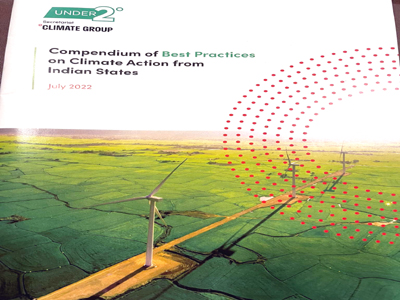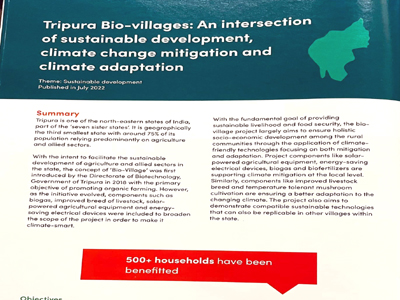
India’s first Bio Village in Tripura gets global recognition
Agartala, Sep 02, 2022, By Our Correspondent335


Tripura has received international recognition for designing and setting up the first Bio Villages in the country. Deputy Chief Minister Jishnu Dev Varma, who also holds the portfolio of the Directorate of Bio Technology under the Science and Technology that handles bio diversity of the state in a Facebook post uploaded the report, ‘A Compendium of Best Practices On Climate Action from India States, and has said, “these bio villages are examples of sustainable development goals (SDG) in some of the remotest areas of the state-taking SDG to the last mile”.
The minister has been all praise for the department for the achievement. However, with the international recognition of the first Bio Villages in the country in its kitty, the Directorate of Bio Technology is expected to give a serious booster to it plan for setting up as many as 100 such villages in the state. In fact, out of 100 such proposed Bio Villages works for 10 Bio villages have already been completed; the first Bio village has been set up at Daspara in Charilam constituency of Sepahijala district.
In its July this year publication the magazine in an article under the title, “Tripura Bio-villages: An intersection of sustainable development, climate change mitigation and climate adaptation” pointed out, with the intent to facilitate the sustainable development of agriculture and allied sectors in the state, the concept of 'Bio-Village' was first introduced by the Directorate of Biotechnology, Government of Tripura in 2018 with the primary objective of promoting organic farming.
However, as the initiative evolved, components such as biogas, improved breed of livestock, solar-powered agricultural equipment and energy-saving electrical devices were included to broaden the scope of the project in order to make it climate-smart.
With the fundamental goal of providing sustainable livelihood and food security, the bio-village project largely aims to ensure holistic socio-economic development among the rural communities through the application of climate-friendly technologies focusing on both mitigation and adaptation. Project components like solar-powered agricultural equipment, energy-saving electrical devices, biogas and biofertilizers are supporting climate mitigation at the local level. Similarly, components like improved livestock breed and temperature tolerant mushroom cultivation are ensuring a better adaptation to the changing climate. The project also aims to demonstrate compatible sustainable technologies that can also be replicable in other villages within the state.
The article said, over 500 households have been benefitted by the project.
The main objectives of the project are- promoting green technologies like solar water pumps, biomass cook stoves and biogas plants for sustainable production of agricultural and allied sector-related products, enhancing the socio-economic condition of small and marginal farmers with the application of simple biotechnological interventions like biofertilizers, biopesticides and mushroom spawn cultivation, enhancing the livestock component by providing improved breeds of animal resources, building capacities of the local communities in the bio-villages through skill and knowledge development.